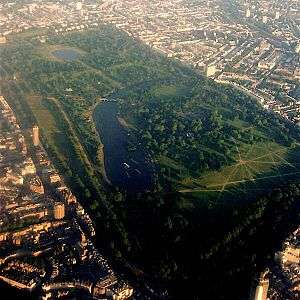Railway Fields
| Part of a series on |
| Harringay |
|---|
| History |
| Locations |
| Other |
|
Railway Fields is a Local Nature Reserve[1][2] and a Site of Borough Importance for Nature Conservation, Grade I,[3] in Harringay the London Borough of Haringey. About one hectare in area, it was a railway goods yard until 1967.
Habitat, flora and fauna

Much of the site is wooded with open birch woodland running along part of the boundary with the railway. Denser woodland and scrub occupies much of the rest of the site. There are areas of grassland and a small pond. At the centre of the reserve a wooden cabin provides an office and a classroom.
Over 200 species of wild flowers have been recorded. This includes the unique Haringey Knotweed discovered in 1987, a cross between the Japanese Knotweed and the Russian vine. More than sixty species of birds have been observed since Railway Fields opened.
History

The area that is now the Railway Fields nature reserve was established as a goods yard on the Tottenham and Hampstead Junction Railway in 1868. It seems likely that the main use of the goods yard was for coal.[4]
Just under 100 years later, in 1967, the yard was closed. In 1975 it was acquired by Haringey Council for a community centre for Haringey Social Services. In 1986 it was opened as a nature park and used as an educational nature reserve. In 1990 it was declared a statutory local nature reserve.
References
- ↑ "Railway Fields". Local Nature Reserves. Natural England. 6 March 2013. Retrieved 22 January 2014.
- ↑ "Map of Railway Fields". Local Nature Reserves. Natural England. Retrieved 22 January 2014.
- ↑ "Railway Fields". Greenspace Information for Greater London. 2006. Retrieved 8 September 2012.
- ↑ Railway Fields Local Nature Reserve Conservation Management Plan, Haringey Council, November 2006.
External links
- Harringay online - Website for Harringay residents
- Photo series by Henry Jacobs on Smug Mug
- The Conservation Volunteers
Coordinates: 51°34′36″N 0°06′05″W / 51.576744°N 0.101419°W
